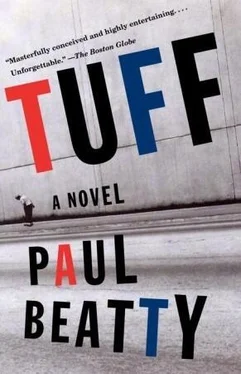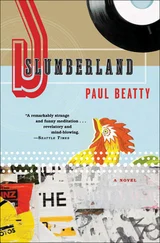Reaching into Yolanda’s purse, Winston pulled out the Raven.22 automatic and flashed an evil sneer. He wondered if he was once again challenging his destiny on the stoop of 258 East 109th Street. “We need to get back to what we do best, the roughness. I’m feeling scandalous, like Richard Widmark in Kiss of Death , fixing to push the old lady in the wheelchair down the stairs. I about get my hustle on. I know my life was spared because I’m destined for a higher purpose.”
“You bugging. After it happened you couldn’t even imagine a higher purpose. Now listen to you.”
Winston held the pistol to his mouth, fogged the muzzle with a gust of hot breath, then began polishing with the underside of his shirt, rotating the gun in the sunlight. “Man, these things are instant imagination. It’s like having a good idea, but you don’t know exactly what it is yet.”
The gun altered the general mood of the gathering. Charles and Nadine reacted to the pistol in much the same way a childless couple reacts to another person’s baby. “My boy, where you’d get that? That shit is nice. Yo, son, let me borrow it.”
Yolanda and Fariq maintained wary yet indifferent cool, respectful of the gun’s power, but knowing that without any immediate provocation there was no real cause for alarm. “Tuffy, that’s Demetrius’s gun. You stupid? You know that piece got bodies on it.” Chambering a bullet, Winston pointed the gun at three uniformed men and a dog about thirty yards away, cavalierly approaching the stairs. Armello panicked and let out a bluesy moan. “Ooooohhhh. Fuck you doing, Tuffy? Drawing down on some cops! Why didn’t you tell me you was dirty? You know I’m on probation, man. I’ll get a bid ’cause your fat ass traveling dirty.”
Armello turned to Fariq, speaking quickly and with a note of urgency in his voice: “Smush, I ain’t trying to go back to jail. I didn’t know Winston was carrying that piece, you my witness, right?”
“Relax, Armello, it’s only Bendito and them.”
As the three men and a dog came closer, Winston lowered his arms, frowning as he hid the gun under his leg. “Thought you were afraid of guns?” whispered Charles.
“Yolanda been working with me. I’m confronting my fears. Doing things to get me used to the piece a little bit at a time. What’s it called, Boo?”
“Phobia densensitization,” said Yolanda, happy to show off one of her Introductory Psychology terms. “But I can tell guns still make you nervous. You’re perspiring and your eyelid is twitching. Wish I had my galvanic skin response equipment from the lab, then I could measure your progress with some objectivity.”
The Bonilla triplets, Bendito, Miguelito, Enrique, and their brown, pink-nosed pit bull, Der Kommissar, stopped at the foot of the stoop. The brothers grew up on 109th Street, two buildings down from Winston; their complexions and politics covered the Hispanic spectrum. Bendito was as handsome as novela’s leading man: gigolo white, his dirty-blond hair permanently tousled by a tropical breeze that seemed to follow him wherever he went. He was enough of a nationalist to spurn the annual Puerto Rican Day parade as an affront to la patria . Every July he’d say, “When we march up Fifth Avenue with guns, like young lords preaching Taino love, then I’ll sing ‘Oye Como Va.’ Tú sabes? ”
Miguelito was a swarthy Cuban-boxer black, but a loyalist to his supposed Spanish Majorcan roots and to the United States. He felt Puerto Rico’s admission to the Union would dignify his beloved isle: “We’ll no longer be dirty. We’ll be exotic, como Hawaii,” he liked to say.
The middle triplet, Enrique Bonilla, suffered from vitiligo. His skin was a splotchy calico of every shade on the melanin palette, and his politics were as convoluted as his complexion. He waffled between all three Puerto Rican destinies: independence, statehood, and its status quo as a United States protectorate.
The triplets were, however, united in their hatred for Winston. The animosity between him and the Bonillas started in elementary school. One day Tuffy noticed Enrique’s face looked like a beginner’s jigsaw puzzle of a map of the United States. He shoved young Enrique into the custodian’s closet and with a felt-tip pen placed a black dot in each sector of Enrique’s face, scribbled a state name in each patch of skin, and labeled every dot with all the capitals he could remember: Sacramento, California, was near Enrique’s right ear; Topeka, Kansas, under his right eye; Indianapolis, Indiana, beneath the left; and Tallahassee, Florida, on the lower left jaw. Winston turned his human political map into the teacher as a makeup assignment for a missed quiz, explaining that the squiggly black line running down Enrique’s forehead, over the bridge of his nose, and ending at the cleft in his chin was the Mississippi River. The feud was set in motion, and thereafter Winston honed his pugilistic skills on the Bonilla triplets.
Despite the Bonilla boys having enrolled in every karate and boxing school in Manhattan, Winston beat the brothers viciously and regularly, pulverizing every zygotic permutation: individually, Bendito and Enrique, Bendito and Miguelito, Enrique and Miguelito, all three at once. Like many bullied city kids, the Bonilla brothers had become auxiliary police officers right after finishing high school. Their civil servitude stemmed not from any sense of social justice; rather, it was a state-sanctioned training course for a job that would serve as an outlet for their vengeance and pent-up rage. Armed only with handcuffs, a flashlight, and a ticket book, the Bonilla brothers had a well-deserved neighborhood reputation for being the last ones on a crime scene, sucker-punching the suspect in a chintzy display of cop solidarity.
The Bonillas and their dog stopped in front of the stoop. The two factions, police and policed, looked at each other in silence for a few moments. Bendito, the oldest brother by three minutes, placed one shiny patent-leather shoe on the bottom stair. The hellhound, Der Kommissar, followed with a stumpy paw. Winston spat, the globule landing inches away from the tip of Bendito’s shoe, and the dog’s paw snapped back to the sidewalk.
“Afternoon, morenos ,” came the greeting from Enrique.
“Buenas tardes a los tres pendejos. Ahora, vete por carajo,” answered Winston. Der Kommissar, whose Spanish was better than the Bonillas’, growled.
“Yo, Tuffy, you better be glad this dog is on a leash, else you’d be in trouble, bro,” cautioned Bendito.
“That dog is leashed for its own protection, because I’m a dangerous nigger. He comes near me, it’s over for him.”
“Don’t you people see the No Loitering sign?” asked Enrique, using his flashlight to point out a rusty metal placard that since the turn of the century had been ignored by the poor and used by the police as an excuse for harassment. Both parties overlooked the broadsides sloppily wallpapered beneath the No Loitering sign. Still wavy and wet with paste, the block of posters read: ON ELECTION DAY EMPOWER YOURSELF AND YOUR COMMUNITY — VOTE FOR MARGO TELLOS DEMOCRAT COUNCIL-WOMAN DISTRICT 8—LIMPIANDO NUESTRAS CALLES.
Fariq made a halfhearted peace offering to the officers. “We’re not loitering. We’re having a board meeting. Planning how to make money this summer.”
“That wouldn’t include drug dealing, would it?” asked Miguelito, both hands tugging at Der Kommissar’s leash.
“I doubt it. We thinkin’ ’bout going legit this summer. Actually, Tuffy was just about to share with us his brainstorms.”
Winston lifted his leg and pulled out the handgun. The Bonillas hurriedly stepped back, falling over each other in a dither. As the triplets disentangled themselves from the dog’s leash, Winston pressed his advantage. He held the small pistol in the flat of his hand, showing it off like a downtown gunsmith. “Way I figure it is, we buy a shitload of guns, paint the noses and barrels that street-cone orange so they look like toy guns. That way when kids about to spark up an officer of the law, such as you all, the cop will freeze for that crucial second, thinking his assailant is holding a plastic toy. Surprise!” Winston stuffed the gun into his pants pocket.
Читать дальше












